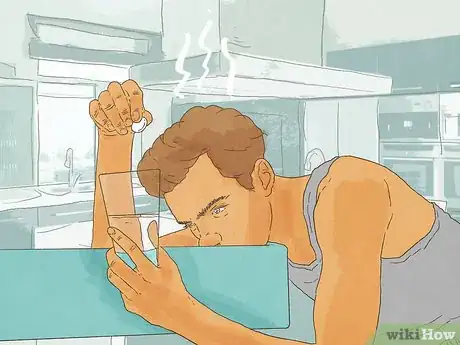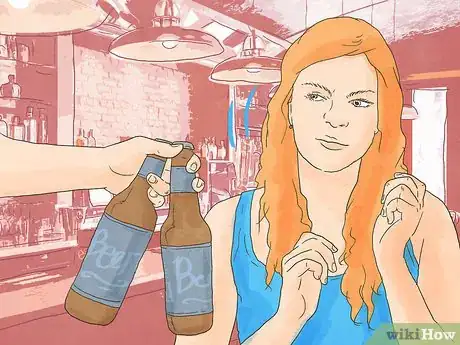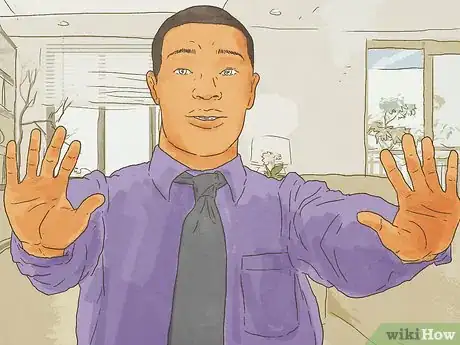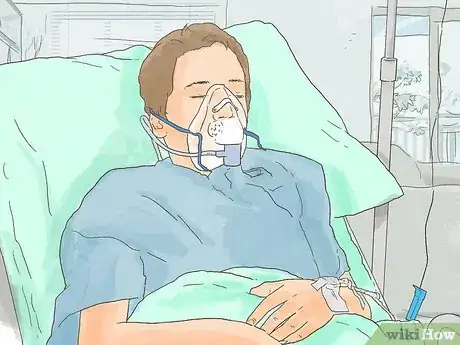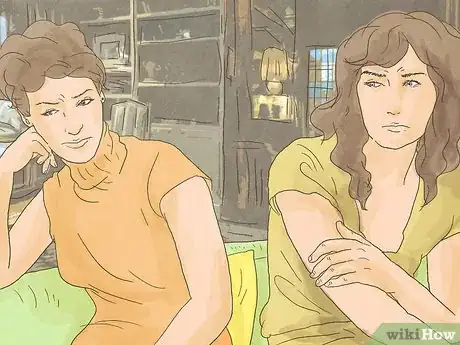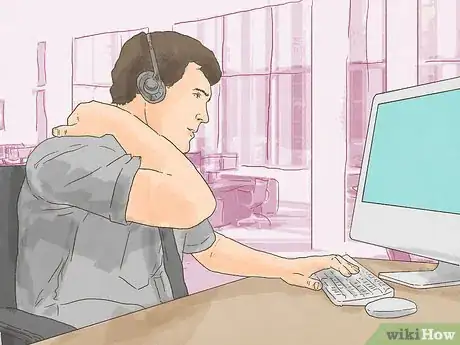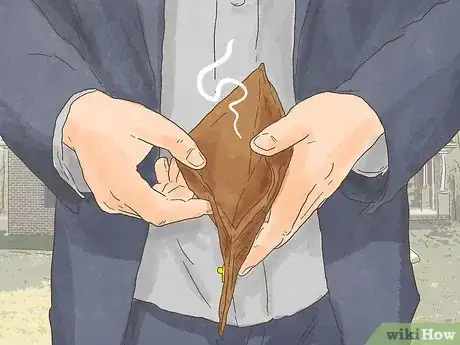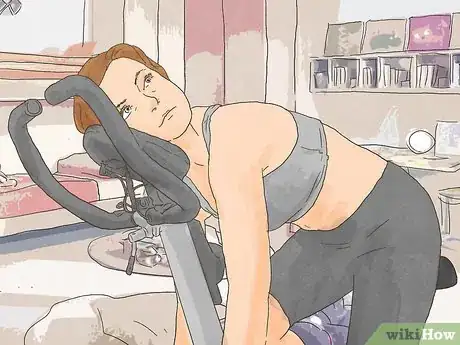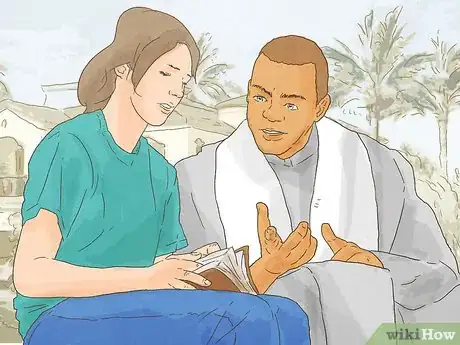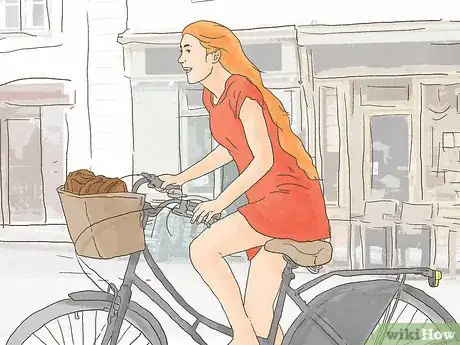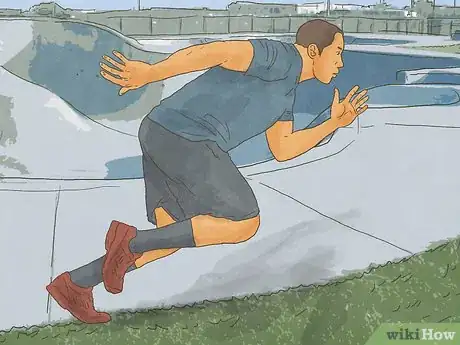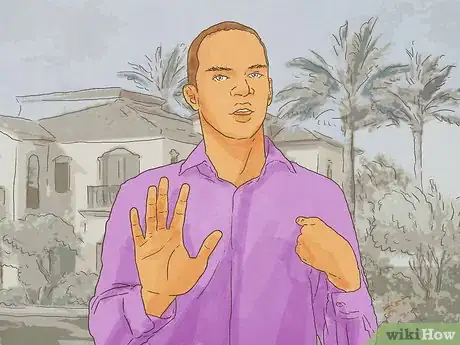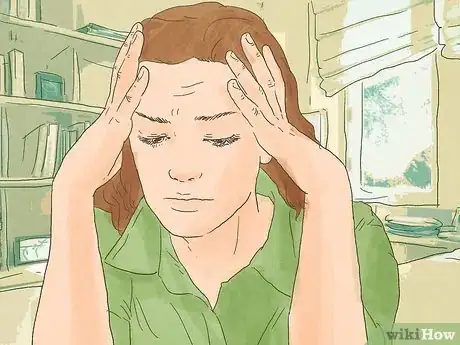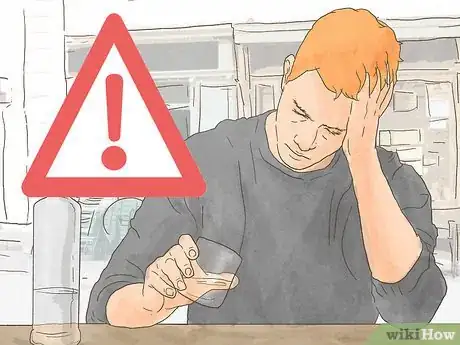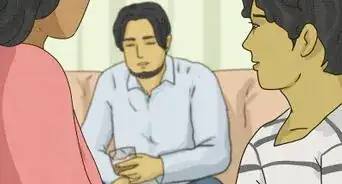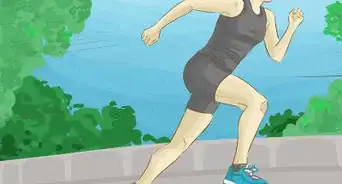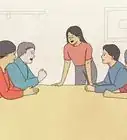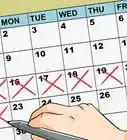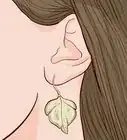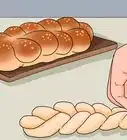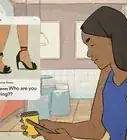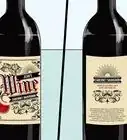This article was co-authored by Lauren Urban, LCSW. Lauren Urban is a licensed psychotherapist in Brooklyn, New York, with over 13 years of therapy experience working with children, families, couples, and individuals. She received her Masters in Social Work from Hunter College in 2006, and specializes in working with the LGBTQIA community and with clients in recovery or considering recovery for drug and alcohol use.
There are 16 references cited in this article, which can be found at the bottom of the page.
This article has been viewed 16,334 times.
Talking yourself out of drinking is the right choice in many situations. Before you talk yourself out of drinking, you’ll need to identify why drinking is unnecessary or inappropriate for you. Once you have your reasons, write them down on a small card. Consult the card later when you’re trying to talk yourself out of drinking. Finally, consider distracting alternatives to drinking like watching a movie, playing a musical instrument, and going for a relaxing bike ride.
Steps
Fighting the Urge to Drink
-
1Remind yourself why you don’t want to drink.[1] Make a list of your top three to five reasons why drinking is a bad idea and carry it on a card in your wallet. When you’re trying to talk yourself out of drinking, consult the list. The list might include things like:
- Drinking is hurting your relationships.
- You have developed a dependency on alcohol.
- You are too young to drink and do not want to risk getting into trouble.
- You make poor decisions when you drink.
-
2Reject thoughts that encourage drinking.[2] When you want to drink, you may think to yourself, “It’s just one drink, it can’t hurt.” When you think this thought, challenge it. For instance, you might respond to your own internal dialogue by saying, “Wait a minute. I know that many times in the past, I decided to have ‘just one drink,’ but ended up having way more. I will stand by my initial choice not to drink.”
- If you think, “Drinking is great fun,” challenge that thought be recalling all the times you did not have fun while drinking. You might be able to recall some occasions you drank too much and were really miserable afterwards.
- If you think, “Drinking doesn’t hurt me,” remind yourself that alcoholism is a serious disease that anyone can fall into.
Advertisement -
3Use psychological tricks on yourself.[3] There are a variety of ways you can reframe the act of drinking in order to talk yourself out of it. For instance, you could adopt a “promotion focus” by looking at the situation to find out how you can end up in a better position later. In the case of drinking, you might recognize how if you talk yourself out of drinking, you will feel much better about your decision later, because you were able to make a healthy choice and do what you really wanted to.
- You could also adopt an attitude that drinking is an irritation. If you think to yourself how annoying it is to drink, you’ll be more likely to talk yourself out of it. For instance, you might think about how noisy and smoky bars are, and how expensive alcohol is, and how you’d much rather spend the night reading a good book than drinking. Think about all the ways drinking is unpleasant in order to make it less appealing for you.
-
4Don’t give in to peer pressure.[4] If your friends are pressuring you to drink, you should resist doing what they want -- especially if you are underage. Going against the grain is easy – just say “no” when your friends ask if you want to drink. Saying no takes confidence, but it’s easy when you know how to do it.
- If you’re a teen, avoid hanging out with new people. Have lunch with them at school a few times and get to know them in a safe environment before going to hang out with them, where you might feel more pressure to fit in.
- You might feel pressure to drink because you don’t want to feel silly. To talk yourself out of giving in to peer pressure and drinking alcohol, remind yourself how bad you’ll feel if you’re caught drinking by the authorities or your parents.
-
5Get support.[5] Talking yourself out of drinking doesn’t have to be a solo endeavor. Tell your friends or family what you’re thinking and feeling. Explain why you don’t want to drink. Ask them to help you talk yourself out of it.[6]
- For instance, you might ask, “Can you think of more reasons why I shouldn’t drink?” Your friends and family will be happy to help you.
- If your family and friends encourage you to drink even though you’re trying to talk yourself out of it, avoid them, at least until you’ve successfully talked yourself out of drinking.
Finding Good Reasons to Stop Drinking
-
1Think about how drinking affects your health. Drinking can have negative impacts on your health. Even moderate consumption can lead to impaired judgment and a lack of coordination, which could cause you to lose your balance or make decisions that might hurt you or someone else. Drinking in excess, over time, could inflame your liver or give you cirrhosis (scarring of the liver). Alcohol consumption has also been linked to cancer of the breast, colon, larynx, mouth, and esophagus.[7]
- Pregnant women risk miscarriage, stillbirth, or fetal alcohol spectrum disorders in their children.
-
2Maintain healthy relationships. Drinking can be disruptive to your friendships and romances.[8] When you drink, you might say or do things that under normal circumstances you would not. Think about your own experience with drinking and how it has affected your relationships with others. How do your friends and family feel about you drinking? Are you proud of yourself when you look back on things you’ve said or done when you’re drinking? Think about how drinking affects your relationships in order to develop a compelling reason why you should not drink.
-
3Meet your responsibilities. If you start drinking, you might have a hangover and be unable to go to school or work the next day. Even if you are able to get up and go, you might not be able to devote your full attention and energy to your work. This could hinder your professional or academic development. Think about your other responsibilities when you’re trying to talk yourself out of drinking.[9]
-
4Save your money. Alcohol is expensive.[10] Instead of drinking, take the money that you would have spent on booze and put it in a little jar. When the jar is full, cash the money in and do something fun. For example, you might:
- buy a new book
- use the money on a short day-trip to the city with friends
- go shopping
- purchase new art supplies
-
5Get in shape. [11] Alcohol has a lot of hidden calories. But unlike the calories from healthy food, alcoholic calories are empty and without any nutritional benefit. Alcohol has a high calorie density, second only to fat. People who drink – especially when they drink frequently – are at risk for developing a “beer belly” – a layer of abdominal fat. Think about how drinking is going to hurt your beach bod next time you’re trying to talk yourself out of it.
-
6Fulfill your moral commitments.[12] Many religions around the world forbid or discourage alcohol consumption. Think about what your own faith says about drinking. If you are irreligious, ask yourself if drinking is compatible with your own ethical outlook. Will drinking help you meet your full potential? Does it have a positive impact on you and those around you?
Looking for Alternatives to Drinking
-
1Distract yourself.[13] There are countless other things to do besides drink. Play a video game with a friend, watch a movie, or read a book. Whatever you like to do for fun when you’re not drinking, do it.[14] Distract yourself for as long as you need to in order to not drink. Useful distractions include:
- Baking a new recipe
- Riding your bike
- Calling a friend on the phone
- Watching an online video
- Playing a song you like on guitar
-
2Find a healthy way to unwind.[15] Lots of people drink because it helps them relax after a long day at work or school. But there are other ways to feel just as relaxed that don’t involve drinking. Join a yoga class, or go for a run or bike ride. Meditation is also a good option.
- Almost any kind of cardiovascular exercise can be used to help you unwind naturally after a long day.
- You could also try taking a relaxing bubble bath.
- Visit the spa for a pleasant massage.
-
3Get a change of scenery. If everyone else is drinking, you might feel pressure to drink, too.[16] Instead of going to the party where everyone is drinking, try going shopping or going out for a bite to eat. Don’t be afraid to propose alternatives to your friends when they want to drink.
- If your friends are never or rarely interested in doing anything but drinking, and the directly or indirectly pressure you to drink, you might need new friends.
- Alternatively, if your friends want to go drinking but you do not, make yourself the designated driver for the whole gang.
- If you’re already in a situation where others are drinking and you’re having a hard time managing your urge to drink, make a graceful exit and head home.
-
4Just say no.[17] Sometimes the easiest thing to do is to just make a decision not to drink and stick to it. After all, nobody can force you to drink. Ignore the urge without doing anything extraordinary to distract yourself or avoid alcohol.
- If a friend asks you to drink with them, say, "No thank you, I am not interested in drinking right now."
- Sometimes you can set a good example for your friends or others simply be refusing to drink.
Recognizing When You Need Help
-
1Ask yourself if drinking is acceptable for you. Certain people should not drink under any circumstances, even in moderation.[18] If you are pregnant or younger than 21 years old, you should not drink. You should also never drink if you’re driving, planning on driving, or using heavy machinery of any kind (including a go-cart, golf cart, chainsaw, or other device that requires coordination and fine motor skills).
- In addition, individuals with certain medical conditions should not drive. Think about your medical history and any medications you might be taking before drinking alcohol.
- Anyone who should not be drinking but does anyway is in need of help from a substance abuse counselor.
-
2Understand excessive drinking. The Center for Disease Control (CDC) defines heavy drinking as more than one drink per day for women and more than two drinks per day for men over the course of a week. Binge drinking is even more serious. For women, binge drinking is defined as drinking four or more drinks during a single occasion. For men, the number is five drinks or more in a single occasion. Both binge drinking and heavy drinking are excessive, and indicate that you need help managing your alcohol consumption.[19]
- Excessive drinking may or may not interfere with your ability to function on a day-to-day basis. It is obvious that people who regularly cannot get to work or school due to excess alcohol consumption need help, but if you meet the qualifications for excessive drinking and still manage to have a successful career and social life, you also need to reduce your alcohol intake.
-
3Get help if you need it.[20] There are many resources available for individuals who drink excessively.[21] The most well-known group that helps people deal with their excessive alcohol intake is Alcoholics Anonymous (AA). There are AA chapters in almost every country in the world.
- AA uses a 12-step program to help you live a life free of alcohol abuse, and introduces you to others who share the same struggle in order to help you learn from their experiences. Look for local chapters in your area.
- Additionally, you should consult a substance abuse counselor to deal with your problem one-on-one. Substance abuse counselors are specially trained to help you understand and overcome your reliance on alcohol. You can locate one by contacting your local health department or addiction treatment centers.
Expert Q&A
-
QuestionHow do I not drink alcohol when everyone else is?
 Tiffany Douglass, MATiffany Douglass is the Founder of Wellness Retreat Recovery Center, a JCAHO (Joint Commission on Accreditation of Healthcare Organizations) accredited drug and alcohol treatment program based in San Jose, California. She is also the Executive Director for Midland Tennessee at JourneyPure. She has over ten years of experience in substance abuse treatment and was appointed a Global Goodwill Ambassador in 2019 for her efforts in residential addiction treatment. Tiffany earned a BA in Psychology from Emory University in 2004 and an MA in Psychology with an emphasis on Organization Behavior and Program Evaluation from Claremont Graduate University in 2006.
Tiffany Douglass, MATiffany Douglass is the Founder of Wellness Retreat Recovery Center, a JCAHO (Joint Commission on Accreditation of Healthcare Organizations) accredited drug and alcohol treatment program based in San Jose, California. She is also the Executive Director for Midland Tennessee at JourneyPure. She has over ten years of experience in substance abuse treatment and was appointed a Global Goodwill Ambassador in 2019 for her efforts in residential addiction treatment. Tiffany earned a BA in Psychology from Emory University in 2004 and an MA in Psychology with an emphasis on Organization Behavior and Program Evaluation from Claremont Graduate University in 2006.
Founder, Wellness Retreat Recovery Center If you're trying to abstain from alcohol but you're having a craving, pause and think about what will happen if you have a drink. Will you feel guilty, need to have another drink, or perhaps even start drinking heavily again? Remember that your craving will pass, but those consequences will remain.
If you're trying to abstain from alcohol but you're having a craving, pause and think about what will happen if you have a drink. Will you feel guilty, need to have another drink, or perhaps even start drinking heavily again? Remember that your craving will pass, but those consequences will remain.
Warnings
- Consult a substance abuse counselor if you drink in excess and need help stopping.⧼thumbs_response⧽
References
- ↑ http://rethinkingdrinking.niaaa.nih.gov/Tools/Interactive-worksheets-and-more/Stay-in-control/Coping-With-Urges-To-Drink.aspx
- ↑ http://rethinkingdrinking.niaaa.nih.gov/Tools/Interactive-worksheets-and-more/Stay-in-control/Coping-With-Urges-To-Drink.aspx
- ↑ https://www.psychologytoday.com/blog/the-science-success/201402/how-make-yourself-do-it-when-you-just-dont-want
- ↑ https://www.ncbi.nlm.nih.gov/pmc/articles/PMC2635065/
- ↑ Lauren Urban, LCSW. Licensed Psychotherapist. Expert Interview. 3 September 2018.
- ↑ http://rethinkingdrinking.niaaa.nih.gov/Tools/Interactive-worksheets-and-more/Stay-in-control/Coping-With-Urges-To-Drink.aspx
- ↑ https://www.hsph.harvard.edu/nutritionsource/alcohol-full-story/
- ↑ http://psychcentral.com/lib/is-alcohol-spoiling-your-romance/
- ↑ http://www.alcoholcostcalculator.org/kids/teens/?page=5
- ↑ http://www.news.com.au/finance/money/why-do-we-pay-so-much-for-alcohol/news-story/1647c23acc476553ade5d77774b8fa7d
- ↑ http://www.gq-magazine.co.uk/article/how-to-lose-your-beer-belly-without-giving-up-alcohol
- ↑ http://www.telegraph.co.uk/foodanddrink/foodanddrinknews/8286945/Reasons-why-you-shouldnt-drink.html
- ↑ http://rethinkingdrinking.niaaa.nih.gov/Tools/Interactive-worksheets-and-more/Stay-in-control/Coping-With-Urges-To-Drink.aspx
- ↑ Lauren Urban, LCSW. Licensed Psychotherapist. Expert Interview. 3 September 2018.
- ↑ http://rethinkingdrinking.niaaa.nih.gov/Thinking-about-a-change/Its-up-to-you/Pros-And-Cons-Checkboxes.aspx
- ↑ http://rethinkingdrinking.niaaa.nih.gov/Thinking-about-a-change/Its-up-to-you/Pros-And-Cons-Checkboxes.aspx
- ↑ http://rethinkingdrinking.niaaa.nih.gov/Tools/Interactive-worksheets-and-more/Stay-in-control/Coping-With-Urges-To-Drink.aspx
- ↑ http://www.cdc.gov/alcohol/fact-sheets/alcohol-use.htm
- ↑ http://www.cdc.gov/alcohol/fact-sheets/alcohol-use.htm
- ↑ Lauren Urban, LCSW. Licensed Psychotherapist. Expert Interview. 3 September 2018.
- ↑ http://www.helpguide.org/articles/addiction/self-help-groups-for-alcohol-addiction.htm
